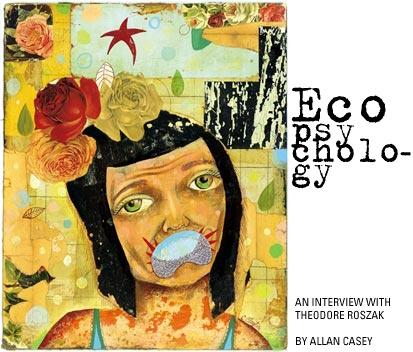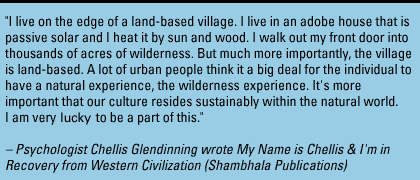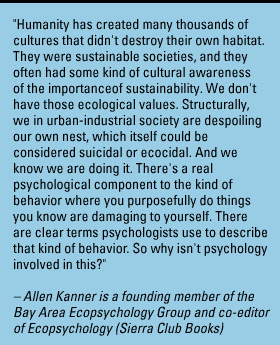Allan Casey
Ecopsychology: An interview with Theodore Roszak

Born to bring ecology and psychology together, the movement has managed to offend hard-liners in both camps. Now the man whose thoughtful book started it all bites back.
We are out of touch with nature and, according to the premises of ecopsychology, it is making us sick. A hybrid of ecology and psychology, ecopsychology makes some blindingly obvious points.
Like, We are estranged from nature. Anyone who’s sat through the Blair Witch Project knows that. Or, We are contemptuous of nature. Have you driven a Ford (or a Nissan or a Lexus) lately? And yet the further reaches of ecopsychology begin to offer some keener insights. For one, that the dominant species in the biosphere – humans – may be psychopathological. For another, that psychology can never hope to define sanity in the insane context of urban-industrial society. Here we begin to bridge the gap between ecologists and psychologists. The term “ecopsychology” was born eight years ago with the publication The Voice of the Earth (Simon & Schuster) by California historian, social critic and novelist Theodore Roszak. A vastly researched and ambitious work, it offers a penetrating history of science and cosmology, explores the Gaia hypothesis and challenges psychology to extend the boundaries of the human mind to include the natural environment. The book spawned a movement. Roszak became a founding member of the San Francisco Bay Area Ecopsychology Group, a director of the Ecopsychology Institute at California State University, and co-edited Ecopsychology with Allen Kanner and Mary Gomes. Yet Roszak maintains an ambivalent attitude to the interdiscipline he founded. Disappointed with ecopsychology’s slow acceptance among both psychologists and activists, he’s left the work to others in recent years. But he describes his newest book, The Gendered Atom: Reflections on the Sexual Psychology of Science, as “very ecopsychological.” And discussing ecopsychology still raises his passion.
When Voice of the Earth came out in 1992, public interest in the environment had reached a peak. But you opened with a sharp critique of your fellow environmentalists. Why?
They had become “doomy and gloomy,” as their critics called them. They were working toward a sort of puritanical social ethic that was threatening to many people. For example, for 20 years environmentalists had been working away on the problem of disposable diapers, for which they had been guilt-tripping American mothers on grounds that they were polluting and filling up the landfills. When they decided to actually do some homework, environmentalists found that the alternatives to disposables were often more environmentally costly because of the hot water, bleach, electricity and so on. And some of them said, “Why don’t we just drop this issue, because we are creating a lot of ill will by vilifying mothers, especially our working class mothers?” It was an opportunity to reconsider the strategies of the movement, and to come up with a very different approach.
Your approach was a bridge between ecology and psychology, an idea that lead to the book. How did you come up with that?
There seemed to be problems with our environmental relations that were so irrational they deserved to be seen from a psychological point of view. Foremost among them was consumerism. I had the feeling that people’s destructive buying and environmental habits arose out of something other than greed. Going shopping seemed to be a form of relaxation, a way of escaping depression or problems in your life, or whatever. I discovered that many people were quite weary of their consuming life and were eager to talk about their consumption habits because they were disturbed by them. The more you looked at it, the more it seemed like addiction. As soon as I hit upon that I thought, well, behavior is the special study of psychologists, so what did psychologists have to say about our environmental relationship?
But Voice of the Earth is no how-to book. It offers psychotherapists no practical advice, and refers to environmentalists very little. It’s more a history of science.
The book was a much bigger thing. It was about cosmology as much as anything. It was not written to start a movement. It was written simply as a book. I would have been happy to see environmentalists pick up these ideas and run with them, but it was not my intention to do that myself.
So it was only after the book’s publication that you began to pursue ecopsychology as an activist?
Yes. After it came out, there were people who led me to believe that maybe this could be an important movement. There was further work and research and I felt there were good grounds for pursuing this. A small group of us here in the San Francisco Bay area came up with a catch phrase: “Psychology needs ecology; ecology needs psychology.” They both had much to gain by sharing insights and concerns.
You didn’t write your book to start a movement, but the movement it spawned has disappointed you deeply. Why?
What I discovered as ecopsychology developed into a small and modest organization was that the barriers were very great. The barriers were the environmental movement itself, and professional psychology itself.
Let’s take those groups in turn. How have environmentalists been a barrier to ecopsychology as a movement?
Environmentalists, by and large, are very deeply invested in tactics that have worked to their satisfaction over the last 30 years, namely scaring and shaming people. I don’t deny for a moment that those tactics will work in that they produce money and numbers, and turn out people for demonstrations, and those things are certainly beneficial. I am questioning whether you can go on doing that indefinitely. In the book, I used Helen Caldecott as an example of someone who pushes that same fear-guilt button over and over again. As psychologists will tell you, when a client comes in with an addiction, they are already ashamed. You don’t shame them further.
Beyond that, I began to realize that many environmentalists find this guilt-tripping, shaming and scaring emotionally gratifying. To stand before an audience and play Cassandra, to say “I am the one person in the world who knows how terrible things are,” actually has a certain perverse gratification.
I felt that one of the most important roles for ecopsychology would be to ask environmentalists to examine their own motivations for what they are doing.

Did you fare better with the psychologists?
There were some psychologists that responded to this – more so than environmentalists – but it turned out to be a small group. They tended to be doing more divergent, humanistic, trans-personal forms of psychotherapy. Academic psychologists were not interested. I never got a single major school or psychologist to research environmental behavior.
One of the ironies is that psychologists have been hired in great numbers to help people consume more. Why can’t we enlist some of them on the other side of the issue, to speak out in defense on the natural environment?
Why are you surprised? Much of your book deals with how psychology is itself purely an urban, industrial phenomenon, and also with the inability of science to comprehend nature.
Perhaps “disappointment” is the right word. When you identify a problem, discuss it, present alternatives, your hope is that people will take it seriously. After all, things do change in the world from time to time in response to a book.
Why are psychologists so reluctant to introduce the natural environment into their work? Why are they unwilling to look at the environmental dimension of human pathology? Psychology, especially in its therapeutic form, has a treacherous function: namely, it convinces people that their happiness – their sanity, their personal fulfillment – is limited to their social relations. It’s almost an act of censorship. If you do psychology in an industrial society, the one thing you need most to hide or suppress is the damage we do to the natural environment. If you took that seriously as factor in personal sanity, you would probably have to call off industrial progress.
As an activist, you wanted to use psychologists to change the definition of wilderness under US law. Can you explain that?
We have in the United States a key piece of legislation called the Wilderness Act. Putting it on the books was one of the major victories of the environmental movement. It defines wilderness in terms of its benefits, and makes it possible to legislate for its defence. Every few years they bring the Wilderness Act up for amendment. My hope was that, with the help of psychologists, mental health could be included as one of the benefits of wilderness. It would be a new kind of case to plead, namely that, say, an old-growth forest is a basic attribute of the health of a community, especially the children growing up in that community. If a child is endangered within a family, from abuse or whatever, a psychologist can be brought in to testify. I am suggesting something parallel, where environmental lawyers would be able to bring in psychologists to say how a community’s mental health might be affected by strip mining in the area.
If ecopsychology questions our sanity as a culture, or even as a species, were we ever sane?
That’s too hard a question for me to answer, because it takes you into speculation about prehistory, times and places that we can no longer access. How we arrived at this predicament in the first place is the deepest and most unanswerable question. You can invent ideas about a prehistoric paradise where people were complete and sane. Maybe some flaw in our genetic make-up makes it possible for us to go crazy, and maybe intelligence is based upon some such trade-off. Perhaps intelligence costs a certain amount of depression and neurosis.

Theodore Roszak’s newest book, The Gendered Atom: Reflections on the Sexual Psychology of Science, examines male bias in scientific inquiry and shows how this prejudice is affected by our relationship to the natural world.
